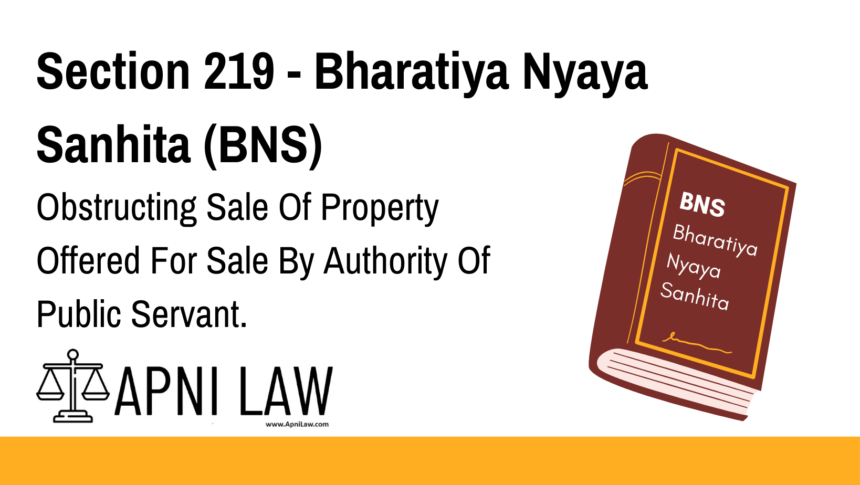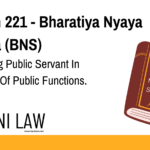Code: Section 219 BNS
Whoever intentionally obstructs any sale of property offered for sale by the
lawful authority of any public servant, as such, shall be punished with imprisonment of
either description for a term which may extend to one month, or with fine which may
extend to five thousand rupees, or with both.
Explanation of Section 219 BNS
What Does Section 219 BNS Cover?
This section penalizes individuals who obstruct or interfere with the sale of property conducted by public servants. Such sales typically occur in cases of:
- Government auctions
- Confiscated or seized property sales
- Court-ordered property disposals
Key Elements of the Offense:
- Obstruction of Sale
- The accused must have intentionally disrupted a sale of property legally authorized by a public servant.
- Property Sale by Lawful Authority
- The property must have been lawfully put up for sale by an authorized public servant.
- Example: A revenue officer conducting a sale of seized assets.
- Punishment
- Imprisonment: Up to one month.
- Fine: Up to ₹5,000.
- Both: In some cases, both penalties may apply.
Illustrations of Section 219 BNS
Example 1: Disrupting a Court-Ordered Auction
A person blocks potential buyers from bidding at an auction of property seized under court orders. This obstruction is punishable under Section 219 BNS.
Example 2: Preventing a Government Land Sale
A group stages a protest and physically prevents officials from selling government land in an auction. This falls under intentional obstruction of property sale.
Example 3: Interfering in a Tax Recovery Sale
A businessman threatens bidders at a tax recovery auction conducted by a revenue officer. Such actions can lead to legal consequences under Section 219 BNS.
Common Questions and Answers on Section 219 BNS
1. Is Section 219 BNS a cognizable offense?
No, Section 219 BNS is a non-cognizable offense, meaning police need court approval before making an arrest.
2. Can a person verbally protest a government auction without punishment?
Yes, verbal disagreement is not punishable unless it physically disrupts the sale.
3. What if the property sale was illegal?
If the sale was unlawful or conducted without proper authorization, the accused may not be guilty under this section.
4. What are the legal defenses under Section 219 BNS?
A person may defend themselves by proving:
- The sale was unlawful or procedurally incorrect.
- They had no intention to obstruct the sale.
5. How is Section 219 BNS different from Section 218 BNS?
- Section 218 BNS punishes resisting lawful property seizure.
- Section 219 BNS punishes obstructing the legal sale of such property.
Conclusion
Section 219 of the Bharatiya Nyaya Sanhita (BNS) ensures that government auctions and property sales can proceed without unlawful interference. Individuals who intentionally obstruct these sales may face imprisonment or fines.
For more legal updates, visit ApniLaw today! 🚀











